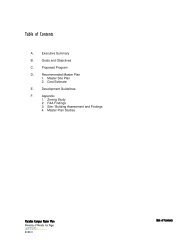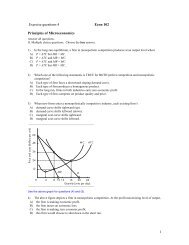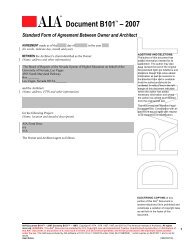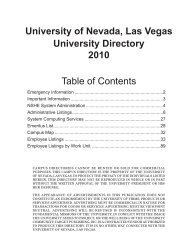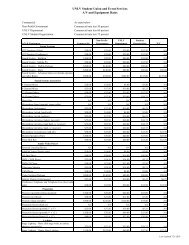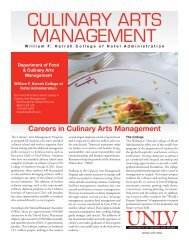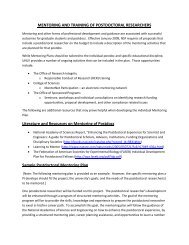Download - University of Nevada, Las Vegas
Download - University of Nevada, Las Vegas
Download - University of Nevada, Las Vegas
You also want an ePaper? Increase the reach of your titles
YUMPU automatically turns print PDFs into web optimized ePapers that Google loves.
R HO T E L MA N A G E M E N T<br />
Robyn Campbell-Ouchida, ’00 M A<br />
Guest Expectations<br />
UNLV survey examines the future <strong>of</strong> technology<br />
in the hospitality industry<br />
Just like the majority <strong>of</strong> industries<br />
worldwide, the hospitality industry<br />
has become more technologically<br />
advanced over the past few decades. With<br />
computerized procedures and delivery<br />
systems, the way things are done is<br />
continually changing. What does that mean<br />
to those in the industry and where will it<br />
go in the future? One Harrah Hotel College<br />
pr<strong>of</strong>essor hopes to be on the forefront <strong>of</strong><br />
these trends.<br />
<strong>Las</strong>t year, pr<strong>of</strong>essor Pearl Brewer<br />
embarked on a study to assess the current<br />
use <strong>of</strong> technology by the hospitality industry<br />
and project future trends. Funded by the<br />
Educational Foundation <strong>of</strong> American Hotel<br />
and Lodging and prepared for the American<br />
Hotel and Lodging Association (AH&LA),<br />
the study was conducted by Brewer and<br />
three additional UNLV researchers: Jungsun<br />
Kim, Thomas Schrier, and John Farrish.<br />
After being initially approached by the<br />
AH&LA in 2007 to oversee such a study,<br />
the team, with help from UNLV students<br />
and faculty, launched an e-mail survey to<br />
key members <strong>of</strong> the hospitality industry.<br />
The purpose <strong>of</strong> the research was to survey<br />
the AH&LA’s membership to determine its<br />
knowledge <strong>of</strong> currently available information<br />
technology (IT) systems, gauge their<br />
understanding <strong>of</strong> future IT requirements<br />
in the hotel industry, and gain an<br />
understanding <strong>of</strong> the IT needs <strong>of</strong> the hotel<br />
industry in the near term. Approximately<br />
6,000 surveys were distributed via e-mail<br />
and 244 responses were received. This is a<br />
response rate <strong>of</strong> 4.1 percent.<br />
Those who responded were mostly<br />
managers (61 percent) and directors (11<br />
percent) <strong>of</strong> hotel operations with more<br />
than 10 years in the industry. They work<br />
for mainly mid-range and luxury hotels and<br />
the ratio <strong>of</strong> independent hotels to chain<br />
properties was nearly equal.<br />
The e-mail survey method was chosen<br />
because it was the most effective method<br />
20<br />
PREMIER ≤ SPRING 2009<br />
<strong>of</strong> data collection. It provided researchers<br />
with faster data collection times and more<br />
geographic flexibility with virtually no<br />
costs. Since the participants are AH&LA<br />
members, the majority are used to dealing<br />
with technology issues as part <strong>of</strong> their jobs,<br />
so the limitations <strong>of</strong> an e-mail survey are<br />
mitigated.<br />
Brewer believes that it is critical for<br />
hotel operators to consider the results <strong>of</strong><br />
the study. “Even in bad times (in terms <strong>of</strong><br />
the economy), it still may be the best time<br />
to introduce technologies that will help<br />
operations and enhance guest services,”<br />
states Brewer. “It will be the operation that<br />
best positions itself for the future that will<br />
win in the long run <strong>of</strong> competition.”<br />
The survey found overwhelming<br />
agreement that IT is important for<br />
increasing employee efficiency (79.9<br />
percent), increasing customer satisfaction<br />
(82.4 percent), and generating revenue<br />
(71.3 percent). However, there was no<br />
agreement on whether technologies or<br />
systems contribute as engines for lowering<br />
expenses.<br />
Respondents did agree that customers<br />
most care about access to Wi-Fi services<br />
(82 percent). With so many business<br />
travelers as well as those who want to<br />
surf the Internet or check personal e-mail<br />
accounts, this has become a sought-after<br />
amenity in many hotel/resorts.<br />
Other amenities deemed important<br />
by hoteliers were in-room entertainment<br />
systems and on-site airline check-in kiosks.<br />
Respondents felt that they have met these<br />
needs in proportion to perceived concerns<br />
and those that did not yet <strong>of</strong>fer these<br />
amenities plan to within the next five years.<br />
In regards to operational improvements<br />
that are facilitated by IT, two-thirds <strong>of</strong><br />
respondents reported that they had<br />
a branded hotel website and over 70<br />
percent reported using the internet and<br />
Wi-Fi networks to improve their operations.<br />
Nearly half stated that they use on-line<br />
purchasing systems and nearly 40 percent<br />
reported using energy management<br />
systems in their properties.<br />
Brewer says she was surprised that<br />
security was not the most important issue<br />
<strong>of</strong> the moment. “There is a lot <strong>of</strong> discussion<br />
around (credit and debit) card industry<br />
compliance standards that must be met<br />
… and the penalties for noncompliance<br />
can put a company out <strong>of</strong> business in a<br />
hurry. Part <strong>of</strong> the solution to this lies in<br />
IT initiatives, but this did not come to the<br />
surface.”<br />
The security <strong>of</strong> IT systems was <strong>of</strong><br />
concern as was the ability to interface with<br />
existing systems. It was also found that<br />
properties with their own IT departments<br />
were more likely to use and plan a wide<br />
array <strong>of</strong> information system security<br />
systems.<br />
“In this down economy, it is clear that<br />
new expenditure in technology must solve<br />
more than one issue such as enhancing<br />
customer service and reducing expenses,<br />
or increase revenue and guest service,”<br />
says Brewer.<br />
“I believe that guest expectations<br />
for new technologies need to be<br />
considered. I’ve heard a lot <strong>of</strong> talk about<br />
the ‘room <strong>of</strong> the future’ and examples <strong>of</strong><br />
these tend to showcase some potential<br />
technologies … but what do guests really<br />
want?” asks Brewer. “This may also<br />
be true for nearly any customer facing<br />
technologies—self-service is a great<br />
example. Are these options empowering to<br />
a guest or are they a turn-<strong>of</strong>f?”<br />
Ultimately, technology is clearly<br />
playing a large role when it comes to<br />
guest satisfaction. By providing amenities<br />
that guests are looking for and using<br />
technologically advanced systems for<br />
purchasing, security, energy management,<br />
and other key operations, hoteliers are able<br />
to better give guests what they want. <br />
Illustration by Grant Codak, ’08



